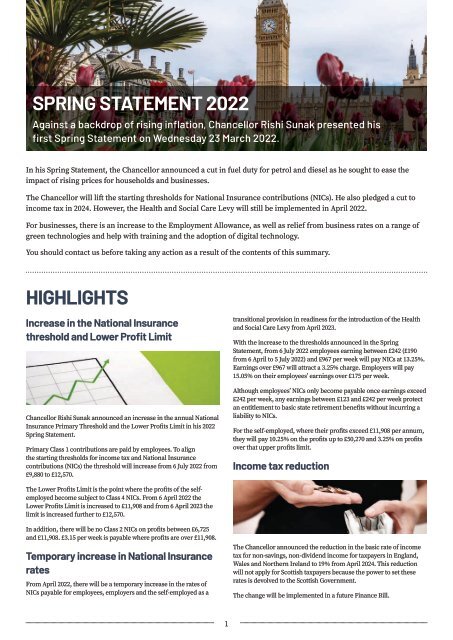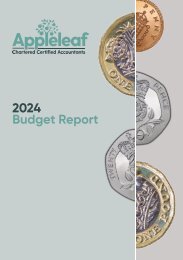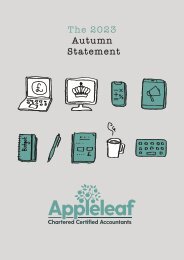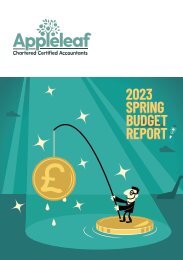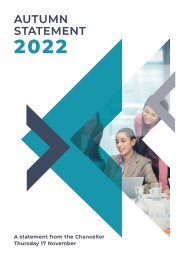Spring Statement 2022
In his Spring Statement, the Chancellor announced a cut in fuel duty for petrol and diesel as he sought to ease the impact of rising prices for households and businesses.
In his Spring Statement, the Chancellor announced a cut in fuel duty for petrol and diesel as he sought to ease the
impact of rising prices for households and businesses.
- No tags were found...
Create successful ePaper yourself
Turn your PDF publications into a flip-book with our unique Google optimized e-Paper software.
SPRING STATEMENT <strong>2022</strong><br />
Against a backdrop of rising inflation, Chancellor Rishi Sunak presented his<br />
first <strong>Spring</strong> <strong>Statement</strong> on Wednesday 23 March <strong>2022</strong>.<br />
In his <strong>Spring</strong> <strong>Statement</strong>, the Chancellor announced a cut in fuel duty for petrol and diesel as he sought to ease the<br />
impact of rising prices for households and businesses.<br />
The Chancellor will lift the starting thresholds for National Insurance contributions (NICs). He also pledged a cut to<br />
income tax in 2024. However, the Health and Social Care Levy will still be implemented in April <strong>2022</strong>.<br />
For businesses, there is an increase to the Employment Allowance, as well as relief from business rates on a range of<br />
green technologies and help with training and the adoption of digital technology.<br />
You should contact us before taking any action as a result of the contents of this summary.<br />
HIGHLIGHTS<br />
Increase in the National Insurance<br />
threshold and Lower Profit Limit<br />
Chancellor Rishi Sunak announced an increase in the annual National<br />
Insurance Primary Threshold and the Lower Profits Limit in his <strong>2022</strong><br />
<strong>Spring</strong> <strong>Statement</strong>.<br />
Primary Class 1 contributions are paid by employees. To align<br />
the starting thresholds for income tax and National Insurance<br />
contributions (NICs) the threshold will increase from 6 July <strong>2022</strong> from<br />
£9,880 to £12,570.<br />
transitional provision in readiness for the introduction of the Health<br />
and Social Care Levy from April 2023.<br />
With the increase to the thresholds announced in the <strong>Spring</strong><br />
<strong>Statement</strong>, from 6 July <strong>2022</strong> employees earning between £242 (£190<br />
from 6 April to 5 July <strong>2022</strong>) and £967 per week will pay NICs at 13.25%.<br />
Earnings over £967 will attract a 3.25% charge. Employers will pay<br />
15.05% on their employees’ earnings over £175 per week.<br />
Although employees’ NICs only become payable once earnings exceed<br />
£242 per week, any earnings between £123 and £242 per week protect<br />
an entitlement to basic state retirement benefits without incurring a<br />
liability to NICs.<br />
For the self-employed, where their profits exceed £11,908 per annum,<br />
they will pay 10.25% on the profits up to £50,270 and 3.25% on profits<br />
over that upper profits limit.<br />
Income tax reduction<br />
The Lower Profits Limit is the point where the profits of the selfemployed<br />
become subject to Class 4 NICs. From 6 April <strong>2022</strong> the<br />
Lower Profits Limit is increased to £11,908 and from 6 April 2023 the<br />
limit is increased further to £12,570.<br />
In addition, there will be no Class 2 NICs on profits between £6,725<br />
and £11,908. £3.15 per week is payable where profits are over £11,908.<br />
Temporary increase in National Insurance<br />
rates<br />
From April <strong>2022</strong>, there will be a temporary increase in the rates of<br />
NICs payable for employees, employers and the self-employed as a<br />
The Chancellor announced the reduction in the basic rate of income<br />
tax for non-savings, non-dividend income for taxpayers in England,<br />
Wales and Northern Ireland to 19% from April 2024. This reduction<br />
will not apply for Scottish taxpayers because the power to set these<br />
rates is devolved to the Scottish Government.<br />
The change will be implemented in a future Finance Bill.<br />
1


